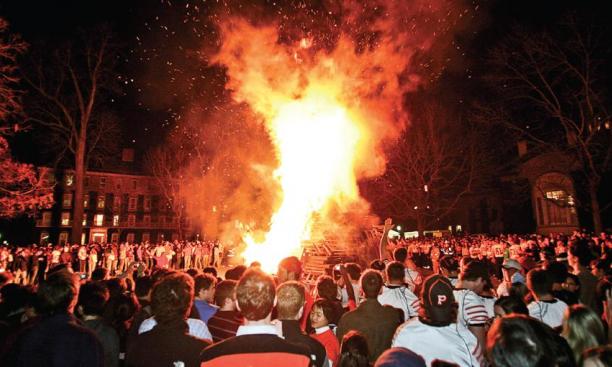

Princeton is a University where personal growth and learning happen not just in classrooms, laboratories, and libraries, but also on playing fields and in rehearsal rooms and dining halls. Our small residential community fosters lasting friendships and opportunities for leadership and service to others that are forged in a staggering number of student- and University-run organizations. Ensuring that each student who arrives on campus is able to find his or her “place” both inside and outside the classroom has been a high priority for the last 10 years.
As readers of these pages know, the past decade has seen significant investments in the quality of residential life and the range of extracurricular options available to students—from the establishment of Frist Campus Center to the creation of four-year residential colleges. Against this backdrop—and the work of last year’s task force on eating club-University relations—I asked Vice President and Secretary Robert Durkee ’69 and Vice President for Campus Life Cynthia Cherrey to lead a working group composed of students, faculty, and staff to review our overarching goals with respect to undergraduate social and residential life and to address the following questions: How can we, as a University, enhance this life both generally and within our residential colleges? What role should sororities and fraternities play at Princeton? And as part of our goal of promoting responsible drinking, is it desirable and feasible to re-establish a campus pub?
After many hours of data-gathering and discussions across campus, the working group has produced a report (www.princeton.edu/reports/2011/campuslife) that captures the character of social and residential life at Princeton today and offers a roadmap for making it even better. I say, “even better,” because, overall, students expressed a high level of satisfaction with their extracurricular experience regardless of demographic factors or living and dining arrangements. On the other hand, there is clearly more we can do to help our undergraduates enjoy the benefits of a diverse yet close-knit student body. Indeed, the working group identified a broad desire for a stronger sense of campus- and class-wide community; for more opportunities for unstructured social activities, such as an annual “snow day” that would give the entire student body permission to “just have fun”; and, among freshmen, for greater interaction with students from other classes.
Noting the popularity of Princeton’s annual dodgeball tournament, the working group affirmed the value of holding additional campus-wide events. It also stressed the importance of more targeted initiatives designed, among other things, to strengthen the bonds within classes, to support juniors and seniors who neither live in a college nor join an eating club, and to give freshmen more interclass contact and mentoring. Other recommendations focused on our residential colleges with the goal of realizing their potential as “holistic communities that create strong feelings of attachment, engagement, and identification,” as well as on the role that residential college advisers, the Outdoor and Community Action programs, and freshman orientation can play in forging and sustaining ties among our students.
The working group also explored the place of Princeton’s sororities and fraternities, which were explicitly banned for much of our history and today exist without official recognition, enrolling some 15 percent of undergraduates. The data that the working group collected suggest that Greek organizations are a polarizing presence on our campus. Proponents regard them as fulfilling an unmet need, especially in terms of fostering cross-class interaction, while others view them as a pipeline to selective eating clubs. Still others see no place for sororities and fraternities at Princeton, given our distinctive social model, and contend they promote early self-segregation based on ethnicity and income because current practice is to recruit freshmen from the moment they arrive on campus. Finally, there is compelling evidence that some of the Greek organizations engage in high-risk and demeaning behaviors. The working group has recommended neither an outright ban nor formal recognition but, rather, a continuation of the status quo with two major qualifications. First, to ensure that freshmen do not narrow their social circle or range of organizational involvements prematurely, it is recommended that students be “prohibited from affiliating with a fraternity or sorority or engaging in any form of rush at any time during the freshman year.” Secondly, the University is urged to invigorate its prohibition on serious forms of hazing, and the destructive conduct associated with it, wherever it occurs—in Greek organizations or other student groups.
The working group’s final charge was to weigh the merits of reinstating a campus pub, and for this they found widespread support, in part because of its potential to model responsible drinking. Both the working group and an affiliated committee tasked with exploring this proposition in detail strongly endorsed the re-establishment of a campus pub, and though the precise location remains to be determined, it was suggested that we consider repurposing either the “Tap Room” at Prospect House or the café in Chancellor Green.
The working group’s recommendations have given us a great deal to consider and to act upon. I am grateful to the members for their thoughtful work, which I believe will lead us toward a University community that serves the extracurricular and social aspirations of all students, including having a very good time!
